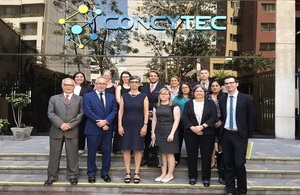1st UK-Peru Science & Innovation Week sets the tone for greater bilateral cooperation
First ever UK-Peru Science & Innovation Week highlighted progress to date in key sectors and great potential for further investment and collaboration.

1st UK-Peru Science & Innovation Week sets the tone for greater bilateral cooperation
Peru marked its first UK-Peru Science & Innovation Week (27 February – 3 March 2017) with a number of milestones in bilateral cooperation in international scientific research and technological collaboration.
Representatives from seven UK-based organisations travelled to Lima as part of a Newton Fund study visit to meet a number of local partners from Peru’s academic and scientific communities, including Concytec, Catholic University of Peru PUCP, the Ministry of Production, Cayetano Heredia University UPCH, and the University of Engineering and Technology UTEC, to identify areas for further research, investment, and collaboration.
The UK has already funded £1.3 million to support over 15 projects in science and innovation in Peru since 2013.
Patrick Shipp, Team Leader for Science, Innovation and Education in the Americas at BEIS, and leader of the Newton Fund delegation said:
This is an extraordinary time for British scientists to be coming to Peru. The extent of scientific research and collaboration between our two countries has increased in the past couple of years already and I am excited at the prospect of growing this partnership even further.
The UK delegation, organised by the Newton Fund and the British Embassy in Lima, is comprised of the Business, Energy and Industrial Strategy Department (BEIS); the Natural Environment Research Council (NERC); the Biotechnology and Biological Sciences Research Council (BBRSC), Research Councils UK (RCUK), the Science & Technology Facilities Council (STFC), Medical Research Council (MRC), and the British Council. The Newton Fund builds research and innovation partnerships with partner countries to support their economic development and social welfare, and to develop their research and innovation capacity for long-term sustainable growth.
Gisella Orjeda, President of Concytec, said:
Having studied genetics at the University of Birmingham, I am well placed to recognise the quality of British universities in areas such as science and innovation. Today, it is all the more important to create partnerships and linkages between colleagues in Peru and the UK. Concytec has been at the forefront of this effort, I look forward to our continued close collaboration with the British Embassy in Lima.
The UK has supported scientific research in Peru through the UK-CONCYTEC Fund with eight innovative research projects to address existing challenges in Peru. These include: enhanced efficiency in the processing of minerals in Peruvian soils, in collaboration with Imperial College London and UTEC; the design and creation of a semi-autonomous surface vehicle to monitor water quality and limnology studies and studying the role of vampire bats in transmitting antimicrobial resistant bacteria to humans and livestock.
As part of the UK-Peru Science and Innovation Week, a delegation comprised of British scientists and representatives of the British Embassy met with Concytec, the National Research Institute for Mountain Glaciers and Ecosystems INAIGEM, and the Peruvian Geophysical Institute IGP, before crossing over the Andes to Huaraz (Ancash region) to visit a tropical glacier situated at over 4,500 metres above sea level and study the effects of climate change on Andean glaciers and mountain ecosystems.
In Lima, scientists from the Newton Fund visited the Radio Observatory of Jicamarca JRO, met the Peruvian Institute of the Sea IMARPE to explore research in marine sciences and aquaculture, and discussed issues in health research with (UPCH), the National Institute of Health INS and the National Institute of Neoplastic Diseases INEN. The delegation also visited the International Potato Centre CIP, where they were able to study a number of varieties of this tuber.
Biodiversity was a key focus as well. Lima hosted Latin America’s first Newton Fund Regional Conference on Biodiversity Research on 3 March. Participants included key government representatives from Argentina, Brazil, Chile, Colombia, Mexico, and Peru, and scientists from the UK’s Natural Environment Research Council (NERC) and Kew Gardens.
In addition, the UK Space Agency recently announced that it will be providing £3.2 million to support two research projects in Peru, in collaboration with local partners, to improve land-use planning and sustainable agricultural production and irrigation in Peru through the use of satellite imaging and mapping.
Finally, from 22-23 March, the British Council and the Foreign & Commonwealth Office, in partnership with the Global Innovation Policy Accelerator supported by the Newton Fund, will be holding a seminar in Valparaiso, Chile, on strengthening the innovation ecosystems of the Pacific Alliance. It will feature policymakers from the UK and Pacific Alliance countries to promote linkages between industry, business, and higher education institutions in the areas of research and innovation.
This is just the beginning. There will be more, even bigger UK-Peru science and innovation announcements in the coming months.
Key Facts:
-
The UK has funded £1.3 million for over 15 projects in science and innovation in Peru.
-
The UK Space Agency is providing £3.2 million for two projects, in collaboration with Peruvian partners, to improve land-use planning and sustainable agricultural production and irrigation in Peru through the use of satellite imaging and mapping.
-
The Newton Fund met Peruvian universities and research centres to identify new areas for future investment and scientific and technological collaboration. The Newton Fund was launched in 2014. It has expanded by doubling its £75 million investment in 2014 to £150 million by 2021, leading to a £735 million UK investment to 2021, with partner countries providing matched resources within the Fund.
-
Seven UK organisations and five Latin American countries attended the region’s first Newton Fund Conference on Biodiversity Research.
You can access the photo album of the Science and Innovation week here.
Contact
Gabriel Real de Azúa, Communications Manager British Embassy, Lima Tel: (51 1) 617 3008 gabriel.real2@fco.gov.uk